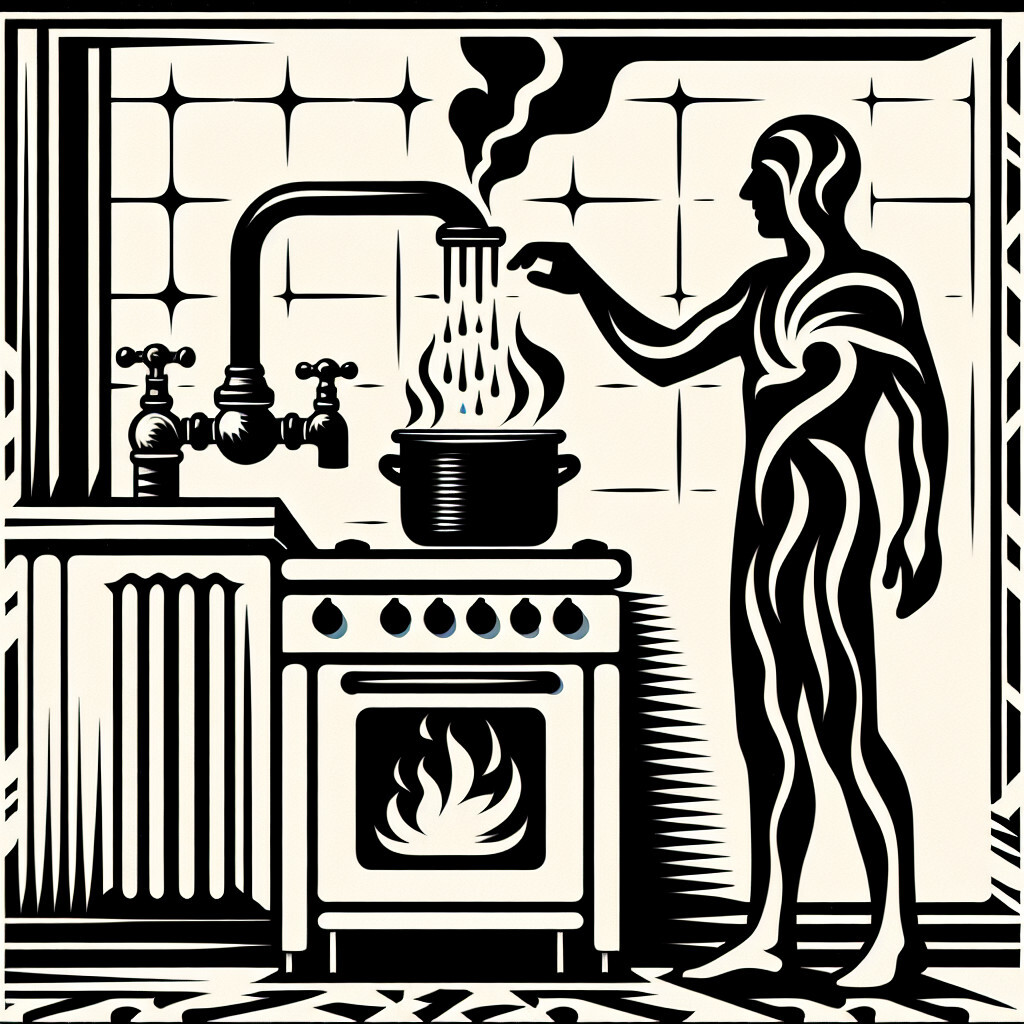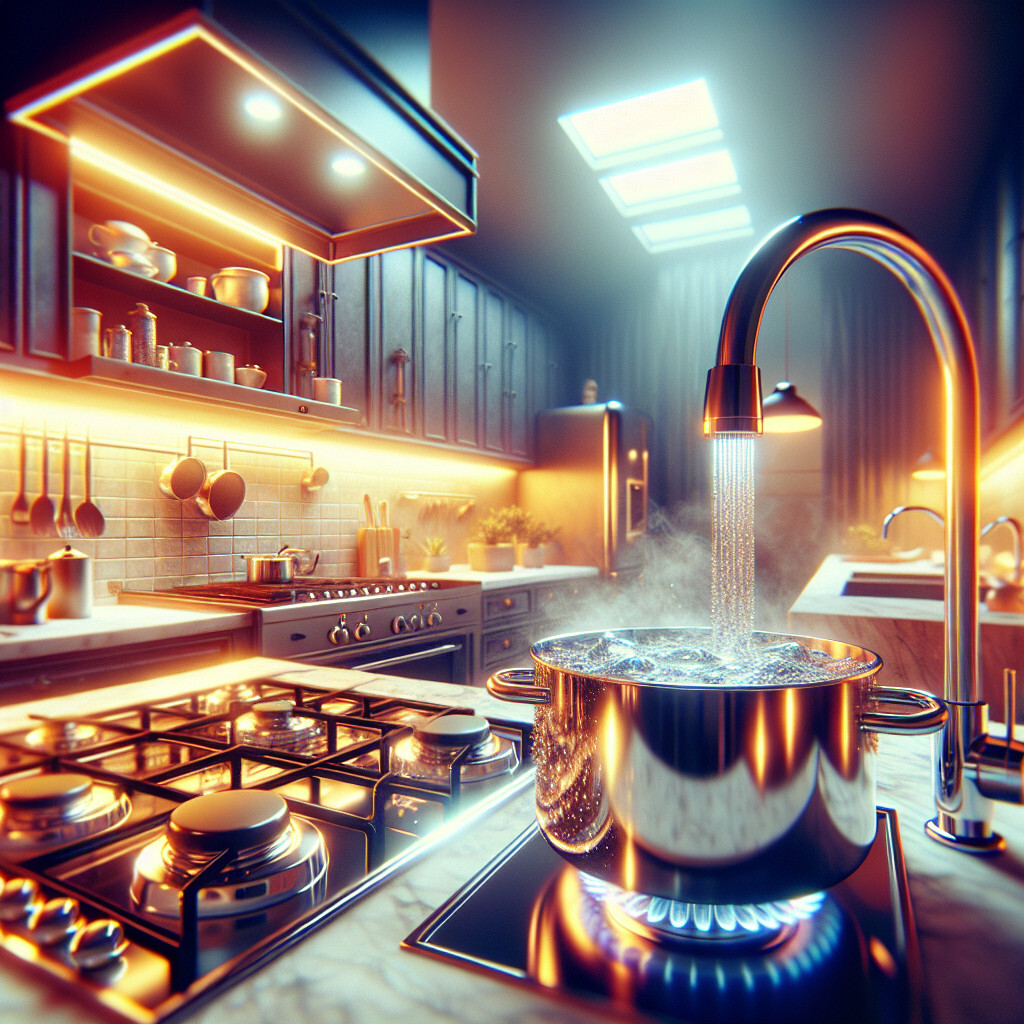-
Table of Contents
“Hot Tap Water: Your Quick Start to Cooking!”
Introduction

Using hot tap water for cooking is a common practice in many households due to its convenience and time-saving aspect. It involves using water from the hot water tap, which is typically heated in a boiler, instead of heating cold water on the stove or in a microwave. While it may seem like a practical shortcut, there are potential health and safety concerns associated with this practice, including the risk of lead contamination and the quality of the water. This introduction will delve into the pros and cons of using hot tap water for cooking, providing a comprehensive understanding of this common kitchen habit.
The Impact of Using Hot Tap Water in Cooking
The use of hot tap water in cooking is a common practice in many households. It is often seen as a time-saving measure, as it speeds up the process of boiling or cooking. However, this seemingly harmless practice may have significant implications on health and safety. This article aims to shed light on the impact of using hot tap water in cooking.
To begin with, it is important to understand that hot tap water is more likely to contain higher levels of lead and other contaminants than cold tap water. This is because hot water has a greater capacity to dissolve substances that it comes into contact with, which includes the material of your home’s pipes. If your home’s plumbing system is old or contains lead pipes, using hot tap water for cooking could potentially lead to an increased intake of lead, a harmful substance that can cause a variety of health problems, including developmental issues in children and cardiovascular diseases in adults.
Moreover, hot water heaters, which are responsible for heating your tap water, can also contribute to the contamination of hot tap water. These heaters can become a breeding ground for bacteria and other microorganisms, especially if they are not regularly maintained or if the temperature is not set high enough. When you use hot tap water from such heaters for cooking, you risk introducing these harmful microorganisms into your food.
In addition to health concerns, using hot tap water for cooking can also impact the taste and appearance of your food. Hot tap water often contains more minerals than cold tap water, which can affect the flavor of your food. For instance, if your tap water has a high mineral content, it can give your food a metallic taste. Furthermore, these minerals can react with certain foods, causing them to change color. This is particularly noticeable when cooking vegetables, as they can turn a dull and unappetizing color when cooked with hot tap water.
Despite these potential risks, the use of hot tap water in cooking is not entirely without its benefits. For one, it can significantly reduce cooking time, which can be a great advantage in today’s fast-paced world. Furthermore, in some cases, the minerals found in hot tap water can actually enhance the flavor of certain dishes.
However, given the potential health risks associated with using hot tap water for cooking, it is generally recommended to use cold tap water instead. Cold tap water is less likely to contain high levels of contaminants, and it does not pose the same risks to the taste and appearance of your food. If you need to use hot water for cooking, consider heating cold tap water on the stove or in a kettle. This way, you can ensure that your water is safe for cooking, without sacrificing convenience or efficiency.
In conclusion, while using hot tap water for cooking may seem like a convenient shortcut, it is important to consider the potential health and safety implications. By opting for cold tap water instead, you can ensure that your cooking practices are not only efficient but also safe and healthy.
Understanding the Health Implications of Cooking with Hot Tap Water
Using hot tap water for cooking is a common practice in many households. It is often seen as a time-saving measure, as it reduces the time required to heat water on the stove or in the microwave. However, it is important to understand the potential health implications of this practice.
Hot tap water can contain a higher level of impurities than cold tap water. This is because hot water dissolves contaminants more readily than cold water. In many homes, hot water is stored in a tank where it can sit for extended periods, allowing more time for contaminants to accumulate. These contaminants can include heavy metals such as lead and copper, which can be harmful if ingested in large amounts over time.
Lead, in particular, is a serious concern. It can leach into hot water from pipes, solder, and fixtures, especially in older homes where lead pipes or lead-based solder may have been used. Even at low levels, lead exposure can have harmful effects on human health, particularly in children. It can affect the development of the brain and nervous system, leading to learning and behavior problems.
Copper, while an essential nutrient, can also be harmful in excess. High levels of copper can cause nausea, vomiting, and diarrhea, and long-term exposure can lead to liver or kidney damage. Like lead, copper can leach into hot water from pipes and fixtures.
In addition to heavy metals, hot tap water can also contain bacteria. Legionella, a type of bacteria that thrives in warm water, can cause a severe form of pneumonia known as Legionnaires’ disease. While most healthy people can fight off the bacteria, it can be dangerous for those with weakened immune systems.
Furthermore, hot tap water can contain more disinfection byproducts (DBPs). These are chemicals formed when disinfectants used to treat public water supplies, such as chlorine, react with organic matter in the water. Some DBPs have been linked to an increased risk of cancer and reproductive problems.
Given these potential health risks, it is generally recommended to use cold tap water for cooking and drinking. Cold water is less likely to contain high levels of contaminants, as it spends less time in the hot water tank and is less likely to dissolve contaminants from pipes and fixtures. If you are concerned about the quality of your tap water, consider having it tested by a certified laboratory.
In conclusion, while using hot tap water for cooking may seem like a convenient shortcut, it can potentially expose you and your family to harmful contaminants. To protect your health, it is advisable to use cold tap water for cooking and drinking, and to heat it on the stove or in the microwave if necessary. By understanding the potential health implications of cooking with hot tap water, you can make more informed decisions about your cooking practices and ensure the safety of your household.
The Science Behind Using Hot Tap Water for Cooking
The practice of using hot tap water for cooking is a common one, often employed for the sake of convenience and time-saving. However, the science behind this practice reveals that it may not be as safe as it seems. This article aims to shed light on the potential risks associated with using hot tap water for cooking and the reasons why cold tap water is generally a safer alternative.
The primary concern with using hot tap water for cooking is the potential for contamination. Hot water dissolves contaminants more quickly than cold water, and many homes have pipes made of lead or copper. When hot water passes through these pipes, it can leach out the metals, leading to higher levels of lead or copper in the water than would be found in cold water. This is particularly concerning given that both lead and copper are toxic when ingested in large amounts, with lead being especially harmful to children.
Moreover, hot water heaters can also contribute to the contamination of hot tap water. These heaters can become a breeding ground for bacteria and other microorganisms, especially if they are not regularly maintained or if the temperature is not set high enough. When hot tap water is used for cooking, these bacteria can potentially make their way into the food, posing a risk to health.
In addition to the risk of contamination, using hot tap water for cooking can also affect the taste and quality of food. For instance, if the water contains high levels of minerals, these can be absorbed by the food, altering its flavor. Furthermore, hot tap water can cause certain foods to cook unevenly. This is because hot tap water often does not reach a consistent temperature, which can result in parts of the food being overcooked while others remain undercooked.
On the other hand, using cold tap water for cooking is generally safer. Cold water is less likely to leach metals from pipes and is less likely to contain bacteria from a hot water heater. Moreover, cold water is often better for cooking certain types of food. For example, when boiling vegetables, cold water can help to preserve their color and nutrients.
However, it’s important to note that the safety of using cold tap water for cooking can also depend on the quality of the local water supply. In areas where the water supply is known to be contaminated, it may be safer to use bottled or filtered water for cooking.
In conclusion, while using hot tap water for cooking may seem like a convenient shortcut, the potential risks associated with this practice make it less than ideal. From the possibility of increased contamination to the impact on food quality, there are several reasons why cold tap water is generally a safer and better choice for cooking. As always, it’s important to be aware of the quality of your local water supply and to take appropriate measures to ensure the safety of the water you use for cooking.
Pros and Cons of Using Hot Tap Water in Food Preparation
Using hot tap water for cooking is a common practice in many households. It is often seen as a time-saving measure, as it reduces the time required to bring water to a boil. However, the use of hot tap water in food preparation is a topic of debate among culinary experts and health professionals. This article aims to explore the pros and cons of using hot tap water in food preparation.
One of the primary advantages of using hot tap water for cooking is the convenience it offers. It significantly reduces the time taken to heat water, which can be particularly beneficial when preparing meals that require boiling or simmering. This can be a boon for busy individuals who are often pressed for time. Moreover, using hot tap water can also help in conserving energy, as less gas or electricity is needed to heat the water to the desired temperature.
However, the use of hot tap water in cooking is not without its drawbacks. One of the main concerns is the potential for contamination. Hot water dissolves contaminants more quickly than cold water. Therefore, if your home’s plumbing system is old or contains lead pipes, using hot tap water for cooking could lead to an increased intake of lead, a harmful substance that can cause a variety of health problems, including neurological damage and developmental delays in children.
In addition to lead, hot tap water can also contain higher levels of other harmful substances. For instance, hot water heaters can harbor bacteria and other microorganisms, which can multiply rapidly in warm conditions. These organisms can then be transferred to the food during cooking, potentially leading to foodborne illnesses.
Another concern is the taste of the food. Some people argue that using hot tap water can affect the taste of the food, particularly when it is used in recipes that require a large amount of water, such as soups or stews. This is because hot tap water can contain minerals and other substances that can alter the flavor of the food.
Despite these concerns, it is important to note that the risks associated with using hot tap water for cooking are relatively low, especially if your home’s plumbing system is in good condition and your water heater is properly maintained. However, if you are concerned about potential contamination, it may be a good idea to use cold tap water for cooking and then heat it on the stove or in the microwave.
In conclusion, while using hot tap water for cooking offers convenience and energy savings, it also carries potential risks, including contamination and altered taste. Therefore, it is important to weigh these pros and cons before deciding whether to use hot tap water in food preparation. If in doubt, consult with a health professional or a culinary expert to make an informed decision.
Q&A
1. Question: Is it safe to use hot tap water for cooking?
Answer: No, it’s not recommended to use hot tap water for cooking due to potential lead and other contaminants that can come from the pipes.
2. Question: Why is hot tap water considered unsafe for cooking?
Answer: Hot tap water can dissolve contaminants more quickly than cold water, including lead if your home has lead pipes or solder.
3. Question: Can I use hot tap water for cooking if I boil it first?
Answer: Boiling water can kill bacteria and other organisms, but it will not remove chemical contaminants like lead that may be present in hot tap water.
4. Question: What is the best type of water to use for cooking?
Answer: It’s best to use cold tap water for cooking and drinking, as it’s less likely to contain any contaminants that can be found in hot tap water.
Conclusion
Using hot tap water for cooking is not recommended due to potential health risks. Hot water can dissolve contaminants more quickly than cold water, and these can include harmful substances like lead from your home’s pipes. Therefore, it’s safer to use cold tap water and heat it up for cooking.






